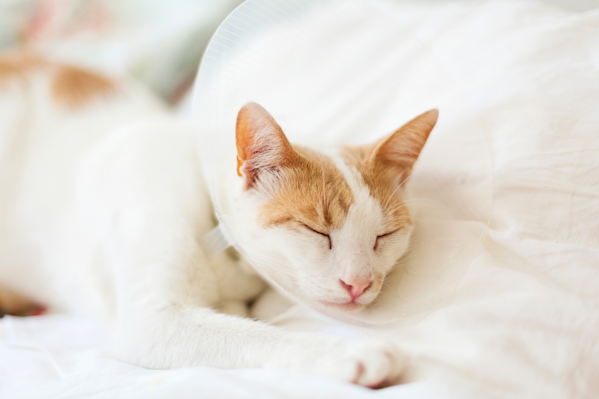While no one wants their pet to have surgery, sometimes it's necessary to keep them as healthy as possible.
Surgery can understandably be scary for both the pet and the pet parent, but there are steps you can take to make sure your pet’s recovery goes smoothly.
These suggestions, along with your vet’s specific instructions for your pet, will make you well-prepared to care for your furry loved one while they recuperate. Here’s what you can do to make sure your pet has a smooth surgery recovery.
What to expect after your pet has surgery
When you pick up your pet from the hospital, chances are good that they won’t be their usual self.
“Many times, especially when it’s a same-day surgery, when you pick up your pet from the vet hospital, they are still a bit loopy from the anesthesia,” explains Dr. Yui Shapard.
The lingering effects of the anesthesia can last until the following day, and may make your furry friend stumble or seem a bit dazed. It’s also likely that they’ll sleep longer than usual the first day or two that they’re home. They likely won't have their appetite back right away, either, so you should only try to feed them about half of their usual food supply, as the anesthesia can make them nauseous and prone to vomiting.
How to care for your pet after surgery
Prepare a comfortable, quiet space
First, you will need to make sure that your pet has a relaxing environment to rest in once they come home from the hospital.
“Keep the lights dim, have them in a quiet area so they can nap, and have lots of soft fabrics for them like cushions and blankets to keep them as comfortable as possible,” recommends Dr. Shapard. “It's also a good idea to have their favorite chew toy nearby, or a hard treat that they can work on for a good chunk of time.”
Depending on the type of surgery your pet has, you also want to make sure their space doesn’t encourage them to be overly active. If you can, try to keep them from going up stairs or jumping on things like your living room sofa.
“If pets become active when the surgical sites (both external and internal) are not fully healed, that could lead to catastrophic complications,” says Dr. Shapard. “This is particularly true for cases that require surgical management of internal organs such as a foreign body removal or a splenectomy (removal of the spleen). Active movement could lead to compromise of the internal suture sites, leading to a very painful and life-threatening situation.”
If you have young children or other pets, it’s best to have them stay away from your recovering pet for the first few days while they’re healing.
Gather the necessary supplies
The hospital most likely sent you home with an Elizabethan collar or cone to prevent your pet from licking their wound. In addition to that, you may also want to have materials on hand to keep the wound clean.
“A clean cloth to wipe away discharge from the incision site is always a good idea to keep the area nice and clean,” says Dr. Shapard. “Having saline available to clean the area is ideal, but if you don't have it, dampen the cloth with lukewarm water and gently wipe excess discharge around the site, avoiding direct contact with the incision as this may potentially cause delay in the healing process.”
Your vet may also have prescribed medication for your pet to manage their pain post-surgery or to prevent infection. If so, make sure to follow the instructions and dosage levels they provided.
Follow up with your vet
“You should follow up with your veterinarian based on the instructions provided for you at discharge,” says Dr. Shapard. “They should have clear recommendations on when to come back for a follow up, and this recommendation will depend on the patient's medical status, the type of surgery performed, the risk of complications, and the general comfort level of the DVM in charge who really knows your pet's medical condition more than anyone else.”
In general, however, veterinarians usually recommend a follow-up appointment within 7 to 14 days. If your pet had a fracture or a deep skin wound, for example, they may have to go back sooner to replace the cast or bandage around the affected area. If the wound site also has continuous or excessive blood draining, extreme swelling, or has discharge that smells unpleasant, you should contact your vet immediately.
If you have specific questions about your pet's recovery from surgery, the experts at Pawp are here for you 24/7. No wait times or appointment necessary.

Reviewed and fact-checked by
Yui Shapard, BVM&S, MRCVS and Medical Director at Pawp
